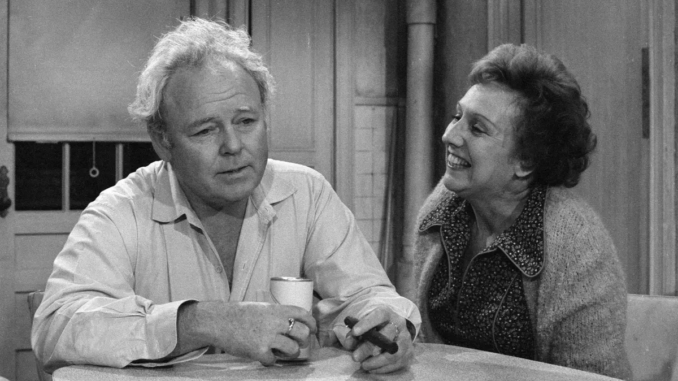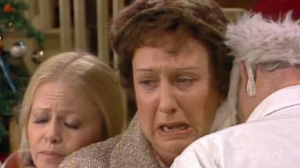
Why ‘All in the Family’ would be all but impossible to pull off today
Norman Lear turned 100 on July 27, and to belatedly mark the occasion, ABC is airing a star-encrusted tribute Thursday, “Norman Lear: 100 Years of Music and Laughter.” On broadcast television, the producer’s home for nearly all his TV career.
The series for which he was best known — including “All in the Family,” “Maude” and “The Jeffersons” — were not necessarily my favorite comedies. There was a lot of yelling. (I preferred the becalmed quiet of his formal radical soap opera parody, “Mary Hartman, Mary Hartman.”) But strong memories suggest that I watched them all, along with “Sanford and Son” and “One Day at a Time.” And there’s no question that these shows, born in an era of war protests, (sometimes militant) liberation movements, presidential malfeasance and an ever-widening generation gap, brought something fresh to the medium, making room for passages of seriousness and emotional depth between the crafted Laughs. “Good Times” (created by “Jeffersons” son Mike Evans and Eric Monte) was the first full-on Black family sitcom; no one had seen the likes of Sherman Hemsley’s George Jefferson. Lear series have looked at racism, homophobia, misogyny, sexual identity, mental health, addiction, aging, rape, PTSD, immigration, gentrification — if there was a point to make, it would be made.
Many of his shows exist in the same fictional world. Before Marvel and DC extended their universes, there was the spinoff. Maude, who first appeared on “All in the Family,” was Edith Bunker’s cousin; Florida, from “Good Times” (a spinoff of a spinoff), had been Maude’s housekeeper. Before they moved on up to a deluxe East Side apartment, the Jeffersons were the Bunkers’ neighbors. Much less successful were “Gloria,” with Sally Struthers as the Bunker daughter, out on her own; “Checking In,” built around the Jeffersons’ former housekeeper, Florence; and “704 Hauser,” from Lear’s brief return to television in the 1990s, in which a Black family moves into the old Bunker house. “Archie Bunker’s Place” was a continuation of “All in the Family”; the faux talk show “Fernwood 2 Night” was a chip off “Mary Hartman, Mary Hartman.”

Born in 1922, Lear was halfway to his centenary when “All in the Family” premiered in 1971; he was by then a seasoned veteran of TV and film, but not one whose name was particularly well known. He began as a comedy writer at the dawn of television, working for Dean Martin and Jerry Lewis on “The Colgate Comedy Hour,” for “The Martha Raye Show” (which he also produced and directed) and for “The Tennessee Ernie Ford Show .” In 1959, Lear co-created his first series, “The Deputy,” a western starring Henry Fonda.
He then teamed up with Bud Yorkin, an Emmy-winning television director who had hired him to write for Ford. In the 1960s, they packaged variety specials and made movies together, including “Come Blow Your Horn,” which Yorkin directed and Lear adapted from the Neil Simon play; “Divorce American Style,” which Lear wrote and Yorkin directed; “Never Too Late,” which Lear produced and Yorkin directed; and the satirical smoking comedy “Cold Turkey,” which Yorkin produced and Lear wrote and directed. It was Yorkin, who would step away from the partnership in 1975, who pointed Lear to the British comedy “Till Death Us Do Part.” Their bickering, political and socially opposing father and son would provide the model for “All in the Family,” into which Lear folded elements of his own family. And so began what we considered as his real career.
“All in the Family” was not the first comedy to tackle hot-button or political issues. Preceding it by two years were James L. Brooks’ “Room 222,” a high school show (a drama really) with Black leads, and the more whimsical “The Governor and J.J.,” a workplace comedy about a conservative governor and his liberal daughter, which sounds very much like Lear before the letter. “The Smothers Brothers Comedy Hour” was famously controversial. But Lear’s insight — perhaps borrowed from “Till Death Us Do Part,” but which he made the foundation of an empire — was to wed topicality to family comedy, traditionally the gentlest of all sitcom forms.
And with few exceptions, Lear’s shows were family comedies, albeit with a twist (often of a knife). Work was mostly incidental to the point; the main cast was largely related, by blood or marriage; most things happened in the living room or the kitchen, the classic settings of multicamera comedy. (The style feels old-fashioned now, but at the time it was novel, the 1960s having been dominated by single-camera sitcoms.) The great situation comedies of the near future were variations on workplace ensemble shows — “M*A*S *H,” “Barney Miller,” “Taxi” — which functions as a metaphor for family. In the Lear series, family provides a metaphor for society.